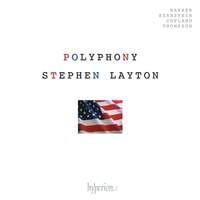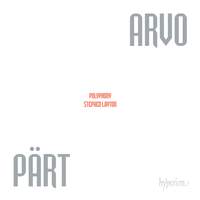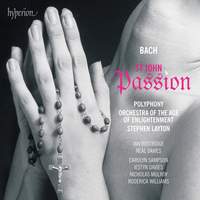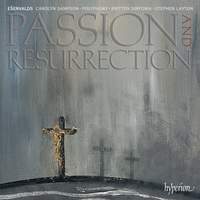Interview,
American choral works from Stephen Layton and Polyphony
 Stephen Layton's latest disc with Polyphony features American choral works from the 20th century, both well-known favourites such as Barber's Agnus Dei and less often-heard works like Thompson's Alleluia. Appropriately enough, it was released at the beginning of July to coincide with the celebration of Independence Day in the USA.
Stephen Layton's latest disc with Polyphony features American choral works from the 20th century, both well-known favourites such as Barber's Agnus Dei and less often-heard works like Thompson's Alleluia. Appropriately enough, it was released at the beginning of July to coincide with the celebration of Independence Day in the USA.
I spoke to Stephen about the selection of works on this disc, and the intriguing question of how they all relate to one another.
For most of these composers, choral music was very much a “sideshow”; even Barber’s perennially popular Agnus Dei is of course an arrangement of a chamber movement. With the exception perhaps of the Agnus, do you think these works have suffered from being seen as outside their composers’ main oeuvre?
Clearly none of these composers are primarily known for their works on this disc. But it’s fair to say, particularly in the case of Bernstein, that he was a song-smith, somebody who wrote all those great musicals and had a gift for setting lyrics. All the pieces on this album are well-wrought and well-crafted pieces of music but their reputations aren’t so high simply because all those composers are known for other music. So it’s interesting, I think, to realise that. Say in Barber’s situation – that lovely setting of Twelfth Night is probably among some of the best pieces he ever wrote, I’d say – but we don’t identify that because we know Barber for other things.
It’s a side that’s not often been revealed. Certainly in the case of the Copland, not least because it’s early Copland so you’re getting a very different feel of the man. And just by writing for four choral parts – it’s a very different discipline to writing for a symphony orchestra, so perhaps you’re hearing something a little more direct, a little more personal – as one often does through choral miniatures, which speak very directly through their text, and the choir, without the big orchestration. It’s very interesting that these American giants should have written choral miniatures.
Speaking of the Agnus Dei… When performing this version of it, do you try to emulate the rich texture of strings in vocal form – perhaps relegating the words to secondary importance – or do you feel the text itself makes for a different (perhaps more sacred) piece and should be focused on?
I’m absolutely not thinking of it as text! Although I’m very much into my texts in the way I create choral sound. Obviously the text is going to have implications for the vowels and the colour of the sound and so on, but what I went for was to imagine that it was a massive string symphony orchestra – I wanted to create that same effect, the culmination of overwhelming intensity and the slow climb of the piece.
It’s actually not very easy to pull it off, it’s a tall order for the choir! Because of the sostenuto, the breath control and trying to keep the energy going. It’s tough for a string orchestra as well, but of course the more players you have the easier it is to create that intensity. I think on the day we did that recording we probably got it right in terms of the pacing and the speed of the thing. It’s very easy to wallow in it and for it to get stuck! And for the phrases not quite to live. So I’d say that although it’s the most famous piece that people will know and love to hate – or hate to love – actually it’s the toughest one to perform on that disc by quite a long way, for a choir.
Maybe, just maybe, it’s actually better in the hands of a great orchestra… the choral adaptation was something of an afterthought. I suppose I feel it only really works as a choral arrangement if one is blessed with very, very good singers! It’s not obviously an easy arrangement for a big choral society.
The Thompson Alleluia is easier to make a good-ish performance of – it’s sung so many times in the United States by lots of choirs. The thing that’s interesting about that is that it reminds me of Arvo Pärt and the spiritual minimalism which we’ve come to see as part of that choral culture today, and yet Randall Thompson is writing nearly a hundred years ago or so, and it’s intriguing that he was brave enough to write something on one word. It’s quite a modern statement. And the way he develops it, quite slowly harmonically – yes, it’s in a much more conservative tonal language than Arvo Pärt, but I hear some kind of early musings of spiritual minimalism, I think.
Would you agree with Copland’s rather harsh dismissal of his own Four Motets as mere student works, lacking evidence of his own personal voice?
I think he’s being harsh on himself. That’s just older age and hindsight, having achieved the status of being what he was, a great American composer. I think if we didn’t know they were written by Copland and we were just served up those motets to sing, I think we would think they were excellent little miniatures in a very sparse style, just a simple four parts – but what a four parts they are! He manages to create extraordinary harmonic progressions. They’re very original.
So I think that’s nonsense – he’s just being slightly defensive of himself, and perhaps slightly turning his nose up at the genre of writing a few little motets, in the light of the ballets Billy the Kid and Appalachian Spring and the big stuff. Maybe it’s because they’re smaller miniatures? But then on the other hand there’s the American Songbook… anyway, I don’t agree with him! And compared to In The Beginning – the tonal language, the pacing, that’s a serious work and a long work, about fifteen minutes, and certainly goes into different realms. A fantastic piece – that could also potentially have been on this album!
Bernstein’s Mass is, as Meurig Bowen’s notes say, a re-working of music written to evoke the time of Joan of Arc for a play. Do you think this detracts from its authenticity as a sacred setting?
No, not really. I think the easiest way I would challenge that about any music that’s had a revival or a second coming is to say look at Handel and Bach! Look at the first chorus of the Christmas Oratorio set to Jauchzet, frohlocket and then recall that it was originally set to something secular! I’m not saying that Bernstein in his choral writing is equal to JS Bach, but I think it’s fair to say we must accept that different adaptations of texts to music can work.
Bernstein wrote this because he had respect for Robert Shaw, who was the great American choral maestro, and Shaw wanted something and Bernstein decided these choruses from The Lark were quite good stuff – a sort of open, sparse style, with the bells, and the colouration of it. And the countertenor, a sort of Chichester Psalms-type thing in his mind, so yes, I think there’s an honest attempt to create something for Shaw. And actually it’s very successful! You’ve got the sacred words, there’s an element of ritual with the bells… It feels to me quite a humanist sort of work. Of course it’s got the Christian text (though of course Bernstein wasn’t a Christian), but for me there’s a sense of humanist celebration in the whole concept of it, which I think works extremely well.
Randall Thompson’s music – represented here by two substantial and extremely beautiful pieces that open and close the album – is relatively unfamiliar to audiences outside North America; what do you think has held it back from making a bigger impression in Europe and elsewhere?
I think sometimes it’s to do with recordings! Once things start getting recorded over here, people then take them up, and I hope that now that we’ve done these couple of pieces we’ll hopefully start getting them done more. I can’t see what else it is that doesn’t allow things to travel, unless it’s that they’re not recorded by people in a certain country. It’s as simple as that – try and look around and see how many recordings there have been of Randall Thompson by an English group and you’ll find very little.
Why haven’t we bothered with it? Well, I suppose there’s probably been a bit of a prejudice against that Alleluia… when English choral conductors hear it, it’s kind of seen as this piece that all amateur choirs in America sing, which is the reason why a professional conductor in England might steer clear of it – it’s seen as hackneyed and overdone.
What intrigued me was that I discovered that Randall Thompson had taught Bernstein, and I thought that was a brilliant connection that let me bring all this music together into one collection – here’s his teacher, and here’s Bernstein then trying to write some music that’s nominally for the Church, in this Missa Brevis, and let’s put it all together! I did know of the Alleluia, I’ve done it once or twice before, but I’m probably like every other person and thought it was a bit old hat and they all sing it in America! But actually that’s the very reason why we should do it. And then having tried it I thought to myself that actually – if you do what it says on the tin with Randall Thompson’s instructions, which are quite prescriptive in dynamics, very terraced and paced so that it doesn’t erupt until the end – there’s a very, very fine piece there. A piece that allows a group like Polyphony to show its beauty of tone and colour and restraint and pacing. It’s actually a marvellous piece.
Do you feel there’s a uniquely “20th-century American” choral sound common to these composers, the way one speaks of the Flemish, Spanish etc schools of Renaissance polyphony?
I find it difficult to say that there is, but I suppose, to answer indirectly, I’d say that their music has actually fuelled and funded a new school of American music which is strong today. So maybe I’m answering yes in a slightly indirect way. All these Lauridsen, Whitacre types and a few others, who have become quite popular in the late 20th century and into the 21st, they all owe their allegiance to Copland, Bernstein and Barber in different ways. I could point you out different pieces of Whitacre and Lauridsen and say “that was Bernstein”, “that was Barber” and so on! To give one very obvious example – Lauridsen set Sure on this Shining Night, and there’s no coincidence there! That was Barber.
So actually I’m talking myself round to thinking yes, there is a discernible American choral school there, of these composers that we’ve recorded, because you can see disciples of it in the next generations.
Available Formats: CD, MP3, FLAC, Hi-Res FLAC
Other recordings by Polyphony
The haunting music of Arvo Pärt is the focus of this disc - which features not merely his more recent works such as Alleluia-Tropos (from 2008) but also his earlier, relatively Modernist compositions dating all the way back the 1970s and beyond.
Available Formats: CD, MP3, FLAC, Hi-Res FLAC
It's hard to imagine a better cast for the Johannes-Passion than the one assembled by Layton for this recording. Ian Bostridge is a peerless Evangelist, and Carolyn Sampson, Iestyn Davies, Roderick Williams and others are stellar in the various solo roles.
Available Formats: 2 CDs, MP3, FLAC, Hi-Res FLAC
Latvian composer Eriks Ešenvalds is at the forefront of the contemporary Baltic school of choral composition, with music characterised by an ethereal, otherworldly beauty. This disc showcases his works, primarily the large-scale Passion and Resurrection.
Available Formats: CD, MP3, FLAC






